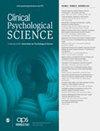自我参照加工与抑郁:系统回顾与元分析
IF 4.1
2区 医学
Q1 PSYCHIATRY
引用次数: 2
摘要
奖励贬值理论认为,抑郁的个体会避免并贬低积极性,这表明他们可能会减少积极的自我图式。先前的元分析综述支持这一关于积极性的理论框架,但没有评估自我参照刺激。自我参照编码和回忆任务评估自我图式,从而进一步了解抑郁个体如何处理自我参照积极性。本系统回顾和荟萃分析的目的是检验抑郁个体在处理自我参照的积极性和消极性方面的差异程度,以及当抑郁个体想到他人(即他人参照)时,这种处理是否会有所不同。结果表明,与非抑郁个体相比,抑郁个体回忆和认可的自我参照积极词汇少于消极词汇,自我参照积极词汇少于他人参照积极词汇。这些发现支持了奖励贬值理论,并表明将抑郁症中的自我参照加工概念化为仅仅基于消极偏见,可能会忽略抑郁症个体如何贬低自我参照积极信息的关键信息。本文章由计算机程序翻译,如有差异,请以英文原文为准。
Self-Referential Processing and Depression: A Systematic Review and Meta-Analysis
Reward devaluation theory posits that depressed individuals avoid and devalue positivity, suggesting that they may hold fewer positive self-schemas. Previous meta-analytic reviews have supported this theoretical framework regarding positivity but have not assessed for self-referential stimuli. Self-referential encoding and recall tasks assess for self-schemas and thus provide further insight into how depressed individuals process self-referential positivity. The aim of this systematic review and meta-analysis was to examine the extent to which depressed individuals differ in processing self-referential positivity and negativity and whether this processing differs when depressed individuals think of others (i.e., other-referential). Results indicate that depressed individuals recall and endorse fewer self-referential positive words than negative words and fewer self-referential positive words than other-referential positive words than nondepressed individuals. These findings support reward devaluation theory and suggest that conceptualizing self-referential processing in depression as merely based on negativity biases can overlook crucial information about how depressed individuals devalue self-referential positive information.
求助全文
通过发布文献求助,成功后即可免费获取论文全文。
去求助
来源期刊

Clinical Psychological Science
Psychology-Clinical Psychology
CiteScore
9.70
自引率
2.10%
发文量
35
期刊介绍:
The Association for Psychological Science’s journal, Clinical Psychological Science, emerges from this confluence to provide readers with the best, most innovative research in clinical psychological science, giving researchers of all stripes a home for their work and a place in which to communicate with a broad audience of both clinical and other scientists.
 求助内容:
求助内容: 应助结果提醒方式:
应助结果提醒方式:


